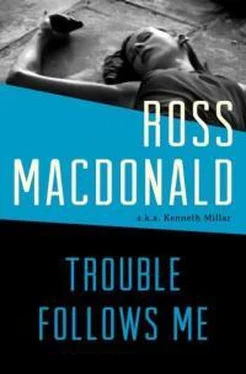“The kind of propaganda they used, chiefly. You know the propaganda that some politicians put out whenever the Federal anti-poll-tax bill comes up on the floor of Congress. That the black race is inferior, unfit for political equality, closer to the apes, careless children for the white men to look after and teach to do a few simple chores?”
I suspected that, consciously or unconsciously, he was quoting from the editorials of the racist press, but his deep voice vibrated with sincerity. He knew what he was talking about, since he had lived intimately with it for forty years.
“I know the kind of stuff you mean. Surely Black Israel didn’t use that sort of thing?”
“Oh, no, Mr. Drake. That’s the point. Black Israel has the same line, but it’s on the other side of the fence. They’re just as violent for black supremacy as the Southern politicians are for white supremacy. Their line is that the day of the white races is over, and the colored races are coming into their own. It’s a line that appeals to the unconscious desires of a good many people of my race, but all it can lead to is trouble. That’s what the Nazis want, of course, but I can’t imagine Hitlerites supporting propaganda for black supremacy.”
“I don’t know. Their motto is divide and rule, and they don’t care how they do the dividing.”
“But they’ve been backing the other corner. I know for a fact that there were fascist agents in some of the violent anti-Negro movements in Detroit. Dr. Wanless confirmed that in his talk on the race riots.”
“They’re quite capable of playing both ends against the middle. I’ll admit, though, that the Black Israel propaganda you’ve described sounds more like the doctrine the Japs have been using in East Asia.”
“That’s exactly what I think, Mr. Drake. I’ve done some reading about the Japanese line in Burma, and this smells like a fish out of the same barrel.”
“Do you know anything about the leaders of Black Israel?”
“They stay in the dark. Black Israel is a secret society. I’ve been approached – I told you that. I’ve listened to their come-on speech and I’ve read a couple of their pamphlets. That’s all I know.”
“Who approached you?”
He had been looking into my face as we talked, holding my attention with intent black eyes. Now he half-turned away and looked out of the open door. He ran the fingers of his right hand through his greying wool in a nervous gesture. Finally he said: “I won’t tell you, Mr. Drake. And if you use the information I gave you, please don’t mention my name.”
“Black Israel is dangerous, isn’t it?”
“You said that a woman you knew got killed.”
“I won’t mention your name. I’m very grateful for what you’ve told me. It was a pleasure to talk to you, Mr. Edwards.”
“Thank you.” A smile kindled on his lined and rather forbidding face. “Well, I better be getting back to work.” Before he went back into the sleeping car, a definite change took place in him. His large erect torso became somehow amorphous. Meaning went out of his eyes like a snake slipping into its hole. His movements became faintly shifty and apologetic, as if all his intentions were subject to change at a moment’s notice on somebody else’s whim. His personality shrank to fit the smooth black shell which white opinion has hopefully constructed for Negroes to live in. Watching this change, which I had never seen before because I had never before seen anything but the smooth shell, I felt a movement of anger and pity stir at the bottom of my mind. I felt that I had witnessed a partial death.
But the rest of my mind was vaguely elated. In less than three weeks I had stumbled across three bodies, each of which had seemed to be projected across my path violently and causelessly out of impenetrable darkness. Some of the shadowy horror of that darkness was beginning now to take form, becoming identifiable as a shape of human evil which I could begin to understand. Understanding it, I could fight it. I was determined to fight it. I hated the cause of those ugly deaths as intensely as I would have if Hatcher had been my brother, and the Jewish girl and the Negro woman my sisters.
Mary came to the door and joined me on the platform. “Mmm,” she said. “I can smell spring in the air.”
“Aren’t you sick of eternal spring, after those months in Hawaii?”
“I was when I left, but a few days of northern winter made me homesick for spring again. Maybe I’ll never go north again.”
“Aren’t your family in Cleveland?”
“Oh, yes. But they can come south. I really think that’s what we’ll do. What were you talking about with the porter?”
“I wrecked my blues last night. He’s going to clean and press them for me.”
“I like you in greys. It took you a long time to persuade him, didn’t it?”
“Oh, we got to talking. I’ve always been interested in the Brotherhood of Sleeping Car Porters.”
Later that day, when she would have less reason to connect my theory with my conversation with the porter, I brought up the subject of Sue Sholto’s death.
“I don’t believe Sue Sholto committed suicide,” I said. “I made some inquiries in Detroit before we left, and I found out that Black Israel is a violent and subversive organization. I believe that Hector Land belonged to it, and that his wife Bessie had learned a good deal about it, perhaps enough to put the finger on one or more of its leaders. Hector himself may be one of its leaders. In any case, I’m reasonably certain that Bessie Land was killed to keep her from talking. It’s barely possible that she was frightened into killing herself, but if so, somebody connected with Black Israel frightened her.”
“You started to say something about poor Sue,” Mary said. She spoke as if the memory was painful to her, and I remembered the terrible jangling which Sue’s death had given her nerves. “What has Bessie Land to do with Sue?”
“I’m becoming more and more convinced that they were killed for similar reasons, if not by the same person, by the same organization. Don’t forget that Hector Land is associated with both killings, and he is definitely a Black Israelite.”
“That’s true,” she said thoughtfully. “Perhaps he killed Sue after all. But why?”
“Certainly not for the reason Mrs. Merriwell gave. Her accusation was a red herring which really served to protect him by confusing the issue. Can’t you think of a reason? I know you feel loyal to Sue’s memory, but can’t you think of anything which would connect her with Hector Land? You saw her every day.”
“Sue lived a quite simple, ordinary life. She had love affairs, but you knew that. She wasn’t promiscuous, she was monandrous while it lasted. Of course she was a Communist, but I don’t see what that could have to do with it.”
“She was a Communist?”
“Oh, I don’t mean that she had a party card. Nothing like that, so far as I knew. She had Communistic views on some things, that’s all. Perhaps I should have called her a fellow-traveller.”
“What things?”
“Government ownership of heavy industry, the race question, things like that.”
“She did, eh? Why on earth didn’t you tell me that before?”
“I saw no point in bringing it out. It seemed irrelevant at the time. You know that the very mention of Communism to a great many people is like a red rag to a bull. It still seems irrelevant to me.”
“It may be irrelevant, but I’m not going to drop it till I make sure. I’m going to ask the FBI to investigate Sue Sholto.”
“Have you been to the FBI?”
“I didn’t mean to tell you that. Yes, I have.”
“Why don’t you leave the case to them, then, Sam? Can’t we forget it for a little while?”
Читать дальше







